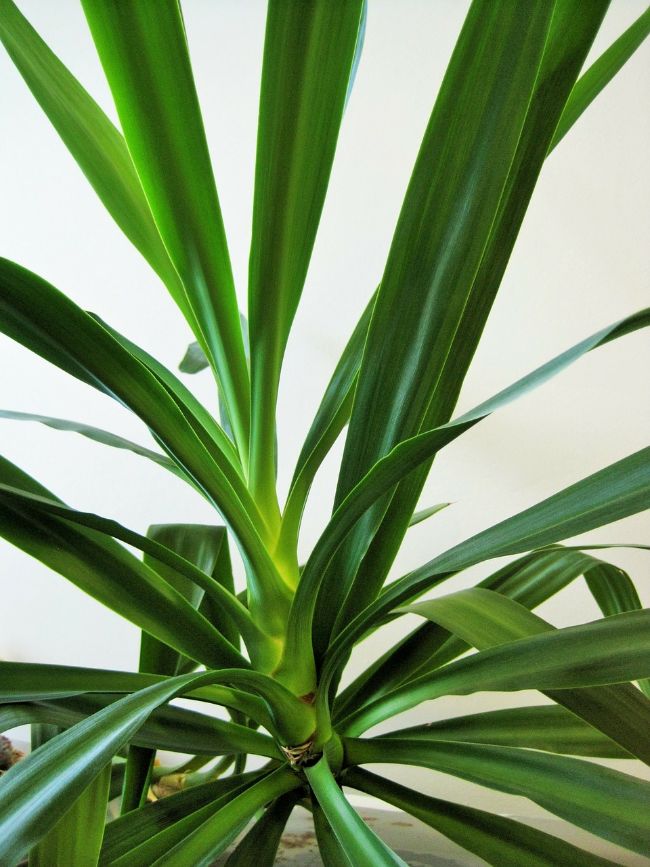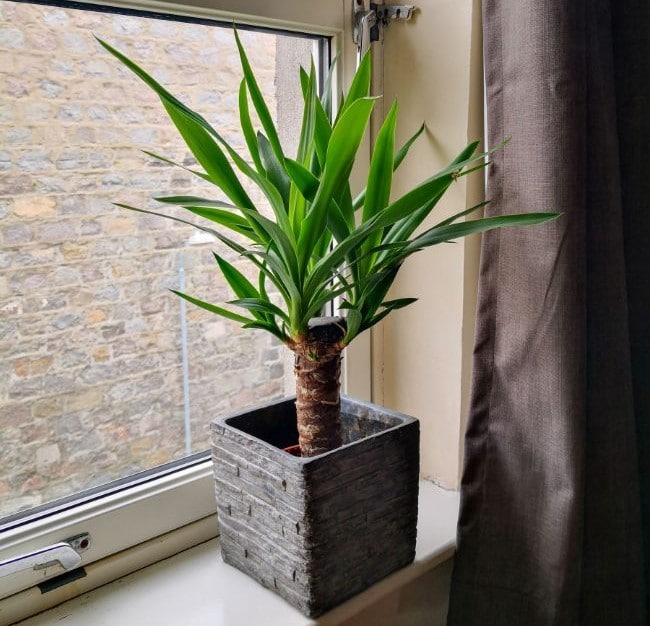A yucca plant is seen by many as a great way to bring a unique, even tropical vibe to any indoor or outdoor space. Whilst generally easy to care for, there are a number of common problems that can result in your yucca plant dying. This article will help you identify the common problems, and get your Yucca plant back to health.
The most common causes of a Yucca plant dying are overwatering, insufficient light, temperature stress, fertilizer problems, transplant stress, pests or disease. You can identify the cause by examining your plant and assessing the conditions it is in. Once the problem is identified, you can take steps to fix it.
Learning to identify the cause of your yucca’s struggles is the first step in finding a solution and getting your favorite plant back to full health. Use this article as a comprehensive guide to identifying, treating, and fixing your problem!
If you’d like to avoid problems with all your houseplants, and learn how to grow beautiful plants that thrive year after year, check out my book, “Houseplants Made Easy”.
Reasons Why Your Yucca Plant Might Be Dying
First, we’re going to take a close look at the potential causes of your yucca plant’s troubles then we’ll tell you how you can identify and solve them. You’ll be happy to know that, in most cases, your yucca plant can make a quick recovery with a few small changes!
Overwatering
A yucca plant is quite tolerant of drought-like conditions which also makes it very susceptible to overwatering. Simply put, your yucca plant probably doesn’t need as much water as you think it does.
If your yucca is overwatered, you might notice that it has generally yellow leaves, root rot, or a trunk that feels spongy. In the early stages of overwatering, simply cutting back on watering and letting the plant and soil dry out is sufficient. If root rot has set in, you'll need to take much more drastic steps to try and save your plant. Read this article to learn how to identify and fix root rot for more info.
Yuccas only need to be watered once the soil has almost completely dried out. Don't water your Yucca on a schedule, but assess the plant and the dryness of the soil before deciding whether to water it or not. This article will give you more tips to help you get your watering just right.
It’s really important to allow the water to drain properly so that it doesn’t sit in the bottom of the pot for too long and damage the plant. This means that you have to use a pot with sufficient drainage. Ensure that the moisture can drain out of the pot naturally. Next, do not use a pot that is too big. A large pot allows the water to remain in the soil for longer than is necessary.

Cold Or Heat Stress
One great feature of the Yucca plant is its ability to withstand many different temperatures in the home. Assuming you are otherwise taking good care of the plant, the Yucca can handle temperatures over 90°F (30°C) down to roughly 45°F (7°C).
Outside of this range, though, is where you might get into trouble. If you notice leaf spots or leaf disfiguration, it might be due to stress from the temperature. Be sure to keep your yucca in an acceptable temperature range. If you live in a colder climate, remember that this is not a plant you can keep outdoors all year round.
Low Light
The yucca plant needs sufficient sun to survive. If your yucca plant is dying, one of the top reasons may be that it is not getting enough sun.
Outdoors, yucca plants thrive in full sun. That said, it is a popular indoor plant as well. If you keep your yucca in the house, place it in a spot that gets a lot of sun. A south-facing window is best. Choose one that gets as much unobstructed sun as possible. Generally speaking, the more sun, the better, especially if you are growing your yucca inside.
Believe it or not, the first sign that a yucca plant is not getting enough light is that the leaves become greener. The plant makes more chlorophyll to compensate for the lack of a natural light source. Shortly after this, though, the leaves start to yellow and will eventually fall off.
Luckily, this problem has a very easy solution. Move your yucca near a window where it will receive more sun. If this was the cause of your problem, your yucca should heal itself pretty quickly.
Sunburn From Excessive Direct Sunlight
As with anything, there is a balance to be had and, even though yuccas love the sun, it is possible to have too much of a good thing.
With the yucca plant, this can happen when they are abruptly moved from an indoor environment to the harsh, outdoor sun. Plants adapt to their environment so if the yucca gets used to a certain amount of sun and is then abruptly moved into the full sun, it may cause damage.
You might notice that the leaves become burnt which appears as yellow and white spots. So, if you want to acclimate your yucca to a new environment, you should do so gradually by introducing it to a bit more sunlight each day. Over time, it will adjust.

Insufficient Or Excessive Fertilizer
Too much fertilizer could be the cause of your Yucca plant dying, and is a much more common problem than too little fertilizer. Yuccas have slow growth patterns and do not need a lot of fertilizer, so it is much more common to have problems due to excessive fertilizer.
You should ideally only fertilize your yucca plant a few times a year. A balanced fertilizer is best. I recommend using either a water-soluble or liquid fertilizer, made up at half the recommended strength. Fertilizing every 2-3 months during the growing season should be more than sufficient.
If you have been applying excessive fertilizer, this will result in fertilizer burns and a sickly plant. Look out for the following signs your yucca plant is dying from excessive fertilizer;
- Brown leaf edges and tips
- Slow growth
- Leaf drop
- Wilting leaves and yellowing of lower leaves
- Slow to no growth.
- A build-up of fertilizer salts in the soil
The best measure against this is caution. Be very sure not to over-fertilize your plant. If you think over-fertilizing is the cause of your Yucca plant dying, flush the soil with plenty of water. This helps leach excessive fertilizer salts out of the soil. Avoid repotting a stressed plant, as this can often create additional stress for your plant.
Read my guide to fertilizing houseplants for more information about how to get this important aspect of plant care right.
Transplant Stress
Transplant stress or shock could be the cause of your yucca plant dying, as this causes an abrupt change in growing conditions for the plant. In this situation, some of the roots may die and they will no longer be able to support the yucca. You might notice the plant starts to wilt, stop growing, and generally look a little sad when this happens.
What you should do in this situation is to always be sure to properly transplant or repot your yucca. Pick a proper sized pot based on the size of your yucca that allows the roots to grow large enough to support the plant. This process should be based on the needs of your specific yucca plant.
Read my article about repotting plants to learn more.
Pests
The yucca plant is a relatively low-maintenance plant and, luckily, that usually extends to pest problems. This plant doesn’t get pests very often and, when it does, it is usually an easy fix. There is a small chance that your yucca can die from a pest infestation but that chance is low.
Regardless, you should be on the lookout for these pests in your yucca plant:
- Aphids: Aphids might be found eating the leaves on your yucca plant. You can rinse them off with some water, or try using insecticidal soap or horticultural oil weekly until controlled.
- Mealybugs: Mealybugs leave waxy markings on your yucca plant which are easy to spot by their white filmy appearance. Rubbing alcohol, horticultural oil or insecticidal soap are good treatments.
- Scale: Scale are hard-armored pests that could overrun the leaves of your yucca. They appear as hard bumps. These can be manually removed, or treated with rubbing alcohol, neem oil or horticultural oil quite effectively.
If you need to get rid of pests on your Yucca, or any of your houseplants, I've used the following treatments with great success. Click the links below to see on Amazon.
Overall, you probably won’t have too many problems with pests on your yucca but it is an important thing to look out for.

Disease
A yucca plant is susceptible to a few diseases that may be responsible for poor health. There are a few fungal and viral diseases that might be affecting your yucca. Learning to identify and treat these diseases can help your yucca get back to good health.
Fungal Disease: You can often spot a fungal disease by the effect it has on your yucca’s leaves. The disease often causes spots on the leaves of your plant because spores from fungi thrive in the water on the yucca’s leaves. For this reason, you should be extra careful not to overwater your yucca plant. If needed, you can purchase a copper fungicide to address a fungus infection.
Blight: Blight is another condition that can affect yuccas. It can cause dark spots on the plant and, because it is spread in the water in the soil, you can let the plant heal by drying it out.
As you can see, many infections and diseases are caused by excess water. The yucca plant does not need a lot of hydration so be careful to avoid overwatering.
Don’t Be Afraid To Ask
Sometimes, you are just going to be stumped as to what the problem is. As a gardener, it’s important to know when it is best to ask. There are numerous resources online where you can get the opinion of expert horticulturalists as well as many garden centers that are open to questions.
Conclusion
If you notice your yucca plant dying, or looking a little worse for wear, it can be a stressful experience! This stress is usually caused by not knowing what is happening and how to fix it. Hopefully, this article has helped you identify the problem with your yucca plant and get it on the road to recovery.
The big takeaway is that the number one cause of a dying yucca is overwatering. It might seem intuitive to water a suffering plant but that might be precisely what is causing the issue. The yucca simply does not need a lot of water and should be properly drained of moisture to thrive.
Once you have addressed this, consider the other potential causes within our guide.
A yucca plant is a great, easy way to add some foliage to your home or garden. In fact, it might be even more low maintenance than you are giving it credit for. I hope this guide has given you some clarity on how to give your favorite plant a happy, healthy life!





